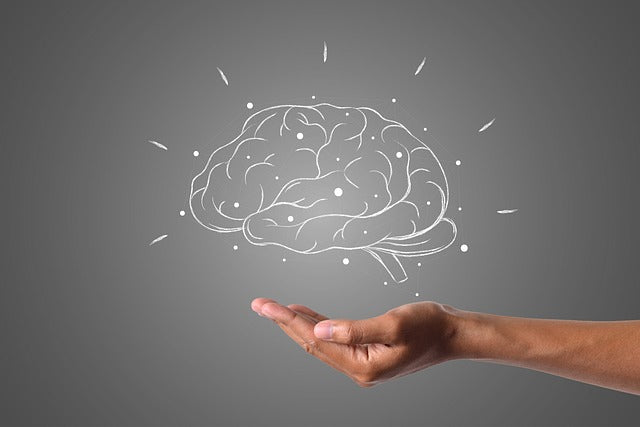Be Smart About Brain Health: Know the Top Phytonutrients and Supplements for Mental Clarity
Most of us know about the foods and nutrients that help protect our hearts—from fish high in Omega 3 fatty acids, to generous helpings of leafy greens, brightly colored vegetables and fruits, and particularly the lavish red, purple and black berries and grapes rich in antioxidants like anthocyanins and resveratrol.[1]
What we may not know is that the very same nutrients, vitamins and minerals that are good for the heart are also great for the brain. If we want to keep our memory sharp, improve our ability to focus, banish brain fog, and increase mental acuity, we must consider the critical role of phytonutrients, vitamins and minerals.[2]
"Research over the past 5 years has provided exciting evidence for the influence of dietary factors on specific molecular systems and mechanisms that maintain mental function," writes integrative biologist, Fernando Gomez-Pinilla, a UCLA professor of neurosurgery. Gomez-Pinilla analyzed over 160 studies on how food affects the brain.[3] In fact, Gomez-Pinilla believes that "dietary management may become a natural, non-invasive, and cost-effective therapeutic solution to maintaining a healthy brain and a strong defense system against some of the most common disorders in the world. In addition… it is likely that the effects of lifestyle on the brain have the capacity to influence neurological health of future generations."
And yet, according to the latest research, Americans are eating nowhere near the amount of healthy fruits and vegetables they need to optimize health. The 2010 Dietary Guidelines for Americans recommend that most people eat at least 9 servings of fruits and vegetables per day, 4 servings of fruits and 5 servings of vegetables.[4] Yet a study found that the average consumption of fruits and vegetables in the United States is only 3.6 servings of fruits and vegetables (1.4 servings of fruits and 2.2 servings of vegetables) per person per day.[5]
Highlights of The Latest Research on Diet and Brain Health
Here are some highlights of the latest research on phytonutrients, vitamins and minerals and brain function.
- Scientists recently discovered that the DASH diet (Dietary Approaches to Stop Hypertension) is not only good for the heart, it can reduce depression. The diet, based on research sponsored by the National Institutes of Health, emphasizes fruits, vegetables, low fat or nonfat dairy, whole grains, lean meats, fish, poultry, nuts and beans.
- Berries, so richly colored, contain phytonutrients that can slow cognitive decline. One recent study, from Brigham and Women's Hospital and Harvard Medical School, followed 16,000 older women over 15 years, and found that those who ate at least a half cup of blueberries or a full cup of strawberries once a week delayed memory decline by 2.5 years.[6] In particular, antioxidants in blueberries such as the anthocyanins cross the blood-brain barrier, and increase levels of brain-derived neurotrophic factor (BDNF), which helps promote new nerve connections correlated with healthy cognitive function.[7] BDNF levels decline with age
- Both nuts and berries can forestall cognitive decline. The synergy of the nutrients and in nuts and berries can "alter cognitive performance in humans, perhaps forestalling or reversing the effects of neurodegeneration in aging."[8]
- Omega 3's, found in fish, can keep mental focus sharp. Consuming omega-3 rich fish just once a week is linked to a 10% per year slower rate of cognitive decline among older adults. And individuals who consume fish at least once per week have a 60% lower risk of Alzheimer's disease. Oily fish such as salmon, herring and sardines are rich in Omega 3 fatty acids but lower in mercury and PCB's.[9]
- A cornucopia of leafy greens can keep your brain humming along in tip-top shape. Researchers at the Rush Institute for Healthy Aging and the MIND Center for Brain Health looked at nearly a thousand healthy adults and discovered that those who ate merely a single serving of leafy greens per day appeared 11 years younger in terms of their cognitive health compared with those who rarely consumed leafy green veggies.[10]
Beyond Diet: Supplements for Energy and Focus
As important as a healthy diet is to longevity, cardiovascular health and cognitive function, many people want an extra edge beyond what diet might provide. What specialized nutrients are associated with enhanced memory, mood, creativity, and ability to pay attention? Are there specific vitamins for memory, or brain health supplements for mental focus?
First and foremost, a complete vitamin, mineral and phytonutrient supplement can offer broad-spectrum support, ensuring that even if there are gaps in the diet, or in digestive capacity, nutrient intake will be more than adequate. From infants to teens to the elderly, nutrient and micronutrient deficiencies are not uncommon.[11],[12] Finding one supplement that blends state-of-the-art nutraceuticals and super-nutrients, along with adaptogenic herbs and molecules that support mitochondrial function, can help protect cognitive health and function, as well as boost the energy required for sustained concentration. Certain adaptogenic herbs are known for their ability to protect and enhance cognition; these include ginseng, which has shown remarkable benefits for cognition and alertness.[13]
A generous supply of phospholipids is also important. Lipids might be called the liquid gold of your brain: about 60% of your entire brain is composed of fats that keep cell membranes flexible and structurally sound. Brain cells are especially rich in a lipid called phosphatidylcholine (PC). A pure source of PC can be beneficial for cognition.[14]
Neuroprotective antioxidants can boost cognitive function and support neuronal function. These include Coenzyme Q10 (CoQ10), which not only supports the cardiovascular system, but the brain and nervous system.[15] Melatonin is another neuroprotective antioxidant that restores healthy sleep cycles and supports healthy mood and cognitive function. Molecular hydrogen is a universal and well-tolerated antioxidant. Hydrogen is one of nature's purest and simplest antioxidants, created by the natural reaction of magnesium with water. Molecular hydrogen is easily able to pass through cellular membranes and the blood brain barrier.[16]
Trace mineral deficiencies are common, even in well-nourished individuals.[17] Adding a good source of trace minerals, such as that provided by seawater harvested from protected plankton blooms, can offer biologically important support to the immune system, nervous system, and neurotransmitters.
You may also be interested in:
Stress Support-101 Gaba and l Theanine the Fast Acting Stress and Anxiety Antidote




